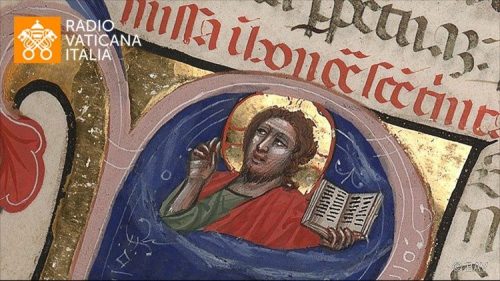READING OF THE DAY
EPH 3:2-12
Brothers and sisters:
You have heard of the stewardship of God’s grace
that was given to me for your benefit,
namely, that the mystery was made known to me by revelation,
as I have written briefly earlier.
When you read this
you can understand my insight into the mystery of Christ,
which was not made known to human beings in other generations
as it has now been revealed
to his holy Apostles and prophets by the Spirit,
that the Gentiles are coheirs, members of the same Body,
and copartners in the promise in Christ Jesus through the Gospel.Of this I became a minister by the gift of God’s grace
that was granted me in accord with the exercise of his power.
To me, the very least of all the holy ones, this grace was given,
to preach to the Gentiles the inscrutable riches of Christ,
and to bring to light for all what is the plan of the mystery
hidden from ages past in God who created all things,
so that the manifold wisdom of God
might now be made known through the Church
to the principalities and authorities in the heavens.
This was according to the eternal purpose
that he accomplished in Christ Jesus our Lord,
in whom we have boldness of speech
and confidence of access through faith in him.
GOSPEL OF THE DAY
LK 12:39-48
Jesus said to his disciples:
“Be sure of this:
if the master of the house had known the hour
when the thief was coming,
he would not have let his house be broken into.
You also must be prepared,
for at an hour you do not expect, the Son of Man will come.”Then Peter said,
“Lord, is this parable meant for us or for everyone?”
And the Lord replied,
“Who, then, is the faithful and prudent steward
whom the master will put in charge of his servants
to distribute the food allowance at the proper time?
Blessed is that servant whom his master on arrival finds doing so.
Truly, I say to you, he will put him
in charge of all his property.
But if that servant says to himself,
‘My master is delayed in coming,’
and begins to beat the menservants and the maidservants,
to eat and drink and get drunk,
then that servant’s master will come
on an unexpected day and at an unknown hour
and will punish the servant severely
and assign him a place with the unfaithful.
That servant who knew his master’s will
but did not make preparations nor act in accord with his will
shall be beaten severely;
and the servant who was ignorant of his master’s will
but acted in a way deserving of a severe beating
shall be beaten only lightly.
Much will be required of the person entrusted with much,
and still more will be demanded of the person entrusted with more.”
WORDS OF THE HOLY FATHER
Dear Brothers and Sisters, Good morning!
In the text of today’s Gospel (Lk 12:32-48), Jesus speaks to his disciples about the attitude to assume in view of the final encounter with him, and explains that the expectation of this encounter should impel us to live a life full of good works. Among other things he says: “Sell your possessions, and give alms; provide yourselves with purses that do not grow old, with a treasure in the heavens that does not fail, where no thief approaches and no moth destroys” (v. 33). It is a call to give importance to almsgiving as a work of mercy, not to place trust in ephemeral goods, to use things without attachment and selfishness, but according to God’s logic, the logic of attention to others, the logic of love. We can be so attached to money, and have many things, but in the end we cannot take them with us. Remember that “the shroud has no pockets”.
Jesus’ lesson continues with three short parables on the theme of vigilance. This is important: vigilance, being alert, being vigilant in life. The first is the parable of the servants waiting for their master to return at night. “Blessed are those servants whom the master finds awake when he comes” (v. 37): it is the beatitude of faithfully awaiting the Lord, of being ready, with an attitude of service. He presents himself each day, knocks at the door of our heart. Those who open it will be blessed, because they will have a great reward: indeed, the Lord will make himself a servant to his servants — it is a beautiful reward — in the great banquet of his Kingdom He himself will serve them. With this parable, set at night, Jesus proposes life as a vigil of diligent expectation, which heralds the bright day of eternity. To be able to enter one must be ready, awake and committed to serving others, from the comforting perspective that, “beyond”, it will no longer be we who serve God, but He himself who will welcome us to his table. If you think about it, this already happens today each time we meet the Lord in prayer, or in serving the poor, and above all in the Eucharist, where he prepares a banquet to nourish us of his Word and of his Body.
The second parable describes the unexpected arrival of the thief. This fact requires vigilance; indeed, Jesus exhorts: “You also must be ready; for the Son of man is coming at an hour you do not expect” (v. 40).
The disciple is one who awaits the Lord and his Kingdom. The Gospel clarifies this perspective with the third parable: the steward of a house after the master’s departure. In the first scene, the steward faithfully carries out his tasks and receives compensation. In the second scene, the steward abuses his authority, and beats the servants, for which, upon the master’s unexpected return, he will be punished. This scene describes a situation that is also frequent in our time: so much daily injustice, violence and cruelty are born from the idea of behaving as masters of the lives of others. We have only one master who likes to be called not “master” but “Father”. We are all servants, sinners and children: He is the one Father.
Jesus reminds us today that the expectation of the eternal beatitude does not relieve us of the duty to render the world more just and more liveable. On the contrary, this very hope of ours of possessing the eternal Kingdom impels us to work to improve the conditions of earthly life, especially of our weakest brothers and sisters. May the Virgin Mary help us not to be people and communities dulled by the present, or worse, nostalgic for the past, but striving toward the future of God, toward the encounter with him, our life and our hope.
(Angelus, 7 August 2016)

